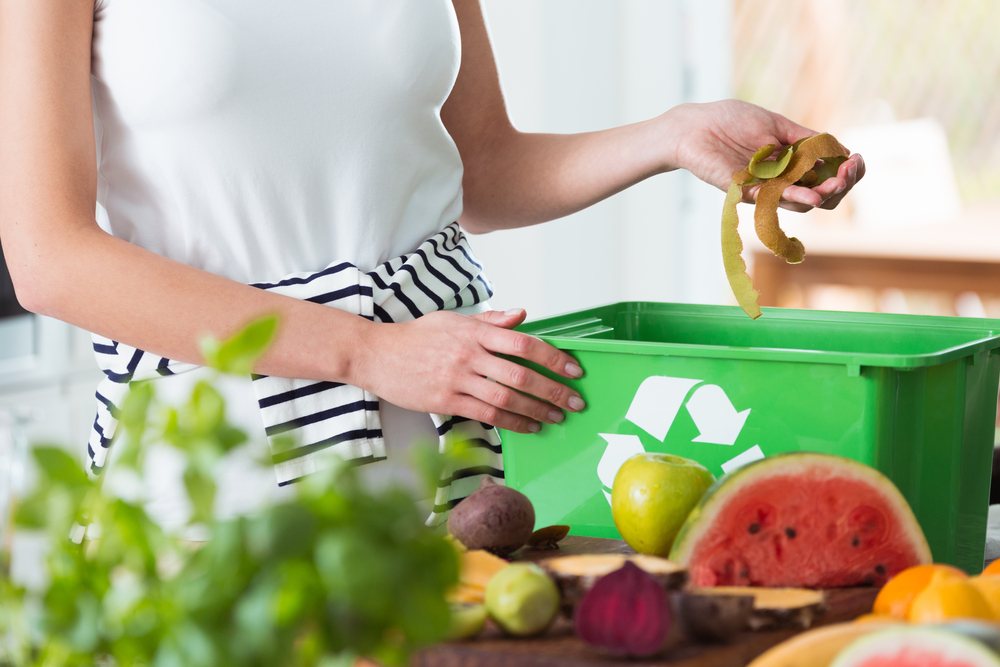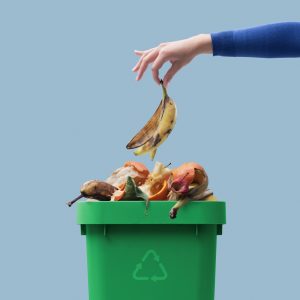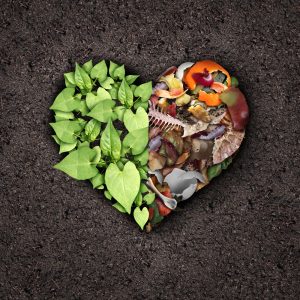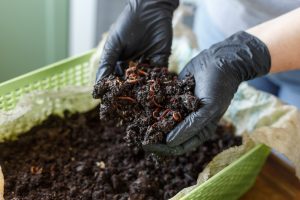

In New York City, organic waste recycling is becoming increasingly important as the population and the density of the city continues to grow. What is organic waste? Organic waste is any type of waste that can be broken down by microorganisms into simple, soluble compounds. This includes food scraps, yard trimmings, paper products, animal manure, and other biodegradable materials.
This blog post will cover organic waste’s elements, how organic waste is recycled, and some easy ways to recycle food scraps in your office!
What Is Organic Waste Made Of?

Organic waste is made up of four main elements: carbon, nitrogen, phosphorus, and potassium. Carbon is the element that helps organic matter decompose, while nitrogen is necessary for plant growth. Phosphorus and potassium are essential for plant nutrition.
When these four elements are present in the right proportions, they create an ideal environment for microorganisms to break down organic matter.
What Types of Organic Waste Is There in the Office?
The most common types of organic waste in the office are food scraps, paper products, and if the office has a garden- yard trimmings.
Food scraps can be any type of food that is no longer edible, including fruits and vegetables, meat and poultry, dairy products, and grains.
Paper products include paper towels, napkins, coffee filters, and cardboard.
Yard trimmings include grass, leaves, and branches.
What Is Organic Recycling & How Does It Work?
Organic recycling is the process of turning organic waste into a usable product, such as fertile soil that can be used to grow more food. The main culprits behind organic recycling are the microorganisms that break down the organic matter and release heat, which speeds up the decomposition process.
Once the organic matter has broken down into compost, it can be used to improve soil structure and texture, increase water retention, and provide nutrients for plants.
If your company operates in an office or other place where employees spend the majority of their day, you will have some organic waste to deal with. The best way to do so is to create a designated area in the office for organic waste.
Setting up a waste system that includes a bin for organics only will help you deal with the formal gathering and later disposal of that type of waste without creating further issues like unpleasant smells and attracting vermin.
Besides simply discarding organic waste along with the other waste in your office, there are a few more, sustainable options you can consider. Here’s what you can do instead.
The first and probably most popular option is composting.
Composting

Composting is the process of breaking down organic matter into nutrient-rich soil. Compost is an excellent fertilizer for gardens and lawns because it contains nutrients that plants need to grow. To make compost, organic waste is placed in a bin or pile and allowed to decompose.
It can be on-site – or done in the office, or off-site – done in a facility that specializes in composting.
If you’re wondering if your office can recycle biodegradable waste, you should know that on-site composting is a good option for any workplace that has enough space to store the compost, or has a garden it can use the compost in.
Of course, the choice to compost in the office or not is up to you, as you can donate your compost to a gardening collective, for example, even if you have no use for it.
However, you should be aware that composting does require some time and investment to be properly managed and not create further issues in the office.
To start with office composting you’ll simply need a composting bin and a few training sessions, to educate everyone on the benefits of composting and what types of food should go in the composting bin.

Vermicomposting is the process of using worms to break down organic matter. This type of composting has many benefits. Worms help restore the soil’s nutrients, it stabilizes the soil and improves its fertility in the long run.
Vermicomposting is a type of organic waste recycling that you can employ if you have a dedicated office recycling team, as it has a significant learning curve, and starting with it might need getting used to.
But if you’ve committed to long-term green goals, like being part of a circular economy where all potential resources are fully incorporated into the sustainable management of your office waste, vermicomposting might be a good option.
To start, we recommend you look for a specialist who can help in setting your vermicomposter and offer advice on how to properly maintain it.
What Organic Waste Should You Avoid Composting?

There are some types of organic waste that you should avoid composting, such as meat and dairy products.
These items can attract pests and create unpleasant odors. You should also avoid composting dead plants, as they can spread disease to other plants in the compost bin.
If you’re not sure whether or not something should be composted, it’s always best to consult with a specialist and avoid spoiling the entire office compost.
Why Is Organic Waste Recycling a Sustainable Practice?

Organic recycling is key to sustaining the ecological balance, preserving natural resources, conserving ecosystems, and promoting biological diversity.
The less we waste the less garbage ends up in landfills, the oceans, and the soil, and the less we contaminate our food and water sources. The less food waste decomposes without proper treatment, the fewer greenhouse gasses manage to escape into our atmosphere and harm the ozone layer.
Along with the immediate effects on our environment and health, organic waste is an excellent raw material for biofuel, offering an opportunity of creating a clean source of energy.
The benefits of proper disposal and management of food waste can be summarized as follows.

Starting your organic recycling journey might seem like a daunting task, but following the example of brands that have already established good practices with recycling might give you ideas on how to better incorporate working recycling practices.
Here are a few leaders who do it right.
In 2016, General Motors (GM) announced that 152 of its facilities are zero-waste. What does that mean? It means that these facilities produce no or almost no waste, converting all their waste into new products, resources, and energy.
Here’s what GM does to decrease its impact on the environment.
Google is another company that will get you inspired to start recycling your office waste, be it plastic, paper, or organic. They have also committed to going zero-waste and are implementing practices that will help them achieve that goal.
Currently, 6 of their data centers have produced zero waste for landfills. Furthermore, 86% of the waste the company’s non-data global centers produce is recycled.
Here are a few more facts about their recycling efforts
You might be wondering if only the big industry leaders are capable of transforming the current waste management landscape? The short answer is “no”.
While brands like Google and GM can dedicate more resources to the cause of turning a linear economy into a circular one, small companies can also have a huge impact.
Take Rice Products, for example. The Brooklyn-based startup uses spent grain from breweries in Brooklyn and Queens to create “super flour” that contains twice as much protein, one-third more crabs, and 12 times more fiber than regular flour.
By upcycling the grain the company can:
All these solutions offer an incredible opportunity for any company to explore the possibilities recycling and upcycling technology and practices can offer.

New York City is a leader in organic waste recycling, and there are many ways to recycle your food waste.
By composting your food waste, you can help reduce greenhouse gas emissions, save money on fertilizer, and create nutrient-rich soil fertilizers for your garden.
If you don’t have the time or space to compost, many companies will pick up your food waste and recycle it for you.
There are a multitude of options when it comes to sustainable recycling practices that you can apply to your business. We hope this article gets you inspired to begin your sustainable journey, or add to the efforts you’re already investing in keeping it green.